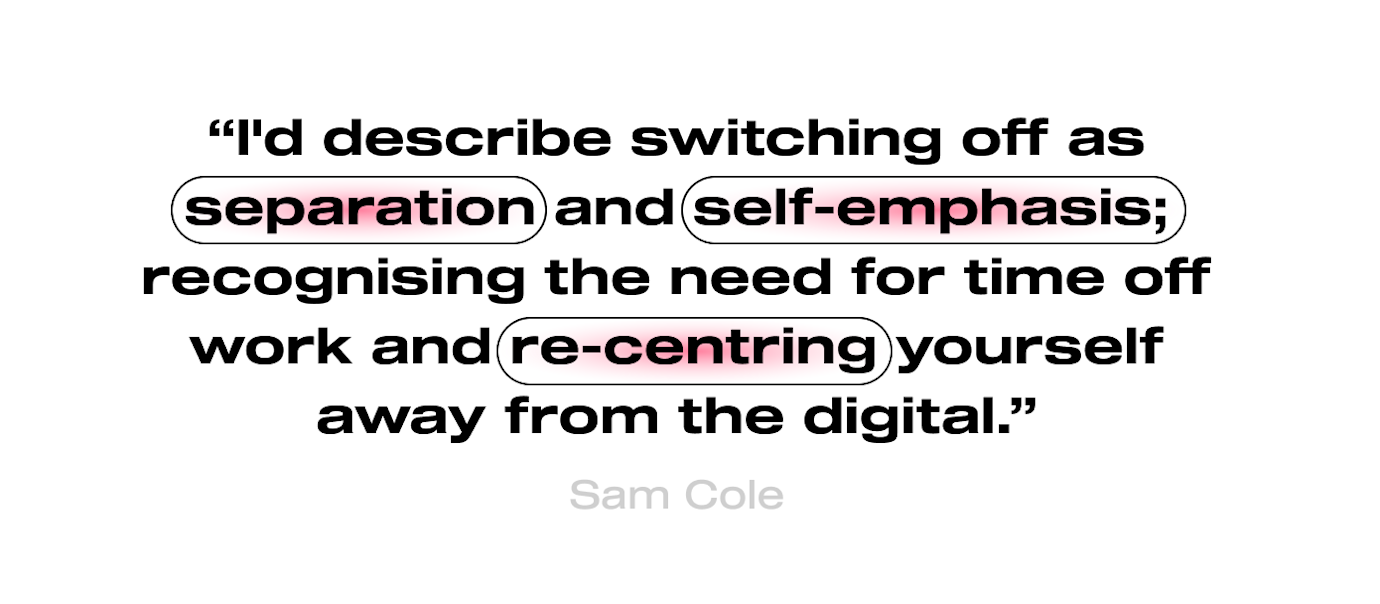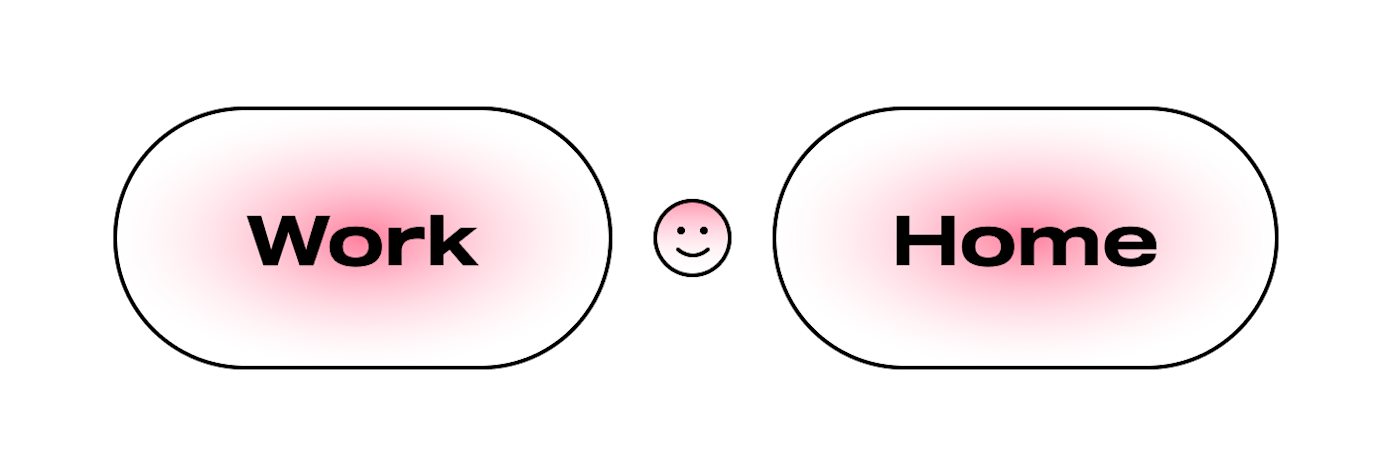Book your creative team
Shortlist all the creatives you need before making your final selection.
Chat to creatives
You can email your shortlisted creatives before finalising the job and budget.
Assigned support
Need a helping hand? Each booking is assigned a clear contact for you to chat to if you ever need support.

How to Switch Off to Improve Your Mental Health
Lockdown has thrown our work and home life out of balance, leaving our mental health to take a back seat. Let's change that.

Sam Cole, on 19 February 2021
Style writer at Highsnobiety
Throughout the past year, the world has endured a rollercoaster of emotions as we transitioned through the COVID-19 pandemic. Lockdown restrictions have come and passed, only to return in an alternate form before evolving to a level we'd hoped was a thing of the past. This is not to say lockdown and social distancing aren't essential, but to highlight the part they've played in the shrinking disparity between work and home, and it's knock-on effect on our mental and emotional wellbeing. With demand for mental health services and disruption of critical mental health services continuing to rise in 93% of countries worldwide, it's become evident that we must undertake the salient task of resolving this imbalance, and normalising 'switching off'.
As a society, we've developed an 'always on' mentality, perpetuated by social media and the pace of consumerism. From read receipts, last online, and the niggling desire to check your emails even when you're on holiday, the inability to switch off has become somewhat habitual. This is particularly true to the fashion industry, with new collections, product drops, editorial, and shoots being worked at a constant.
The intersection of availability and always being home (thanks to lockdowns) was initially met with curiosity through opportunities for home working and self development. Work from home was, and for many still is, the new normal. No more early morning rushing to make your commute into the city, gone was the need to piece together outfits for each day of the week; now, work came to you, the ultimate in comfort. Or so it may seem. While the benefits of working from home come in abundance, some have found it to bring an uncomfortable proximity - the inability to separate home and work life. A burden especially true to those living alone. For those like myself, that have spent a majority of the past three years working from home, this blended arrangement was all too familiar.
Fast forward to what we've aptly named lockdown three and that familiarity has, to an extent, become symbiotic.

So now; we're not only 'always on’, but your home, perhaps even your bedroom, has become an office. With rising unemployment; continued restrictions, a lack of real social interaction, the anxiety of falling sick or being the cause of somebody else's suffering, and a high daily death toll, societal anxiety and general mental wellbeing are suffering to a high degree.
Without access to some of the usual emotional outlets we have worked into our routines, such as going to the gym or spending time amongst family and friends, our anxieties and negative feelings are afforded an equal opportunity in all areas of our lives. While some have developed ways of physically and mentally separating work and home, many are attempting to 'power through'.
Powering through, if it works for you, is absolutely fine. There is, however, a precedent to push our limits beyond our personally-defined balance to 'keep up'. Couple this with a recognition that many are unable to work or are unemployed due to the pandemic, and our gratitude for employment further overshadows our ability to switch off.

Now we must ask, what does it mean to switch off? For me, I'd describe switching off as separation and self-emphasis; recognising the need for time off work and re-centring yourself away from the digital.
How we scale what switching off looks is personal; it can be as small as making sure your email notifications are disabled at a set time, keeping your phone off until a set time, or deactivating your socials for an extended period.
Fear of missing out is a real issue, and the microwave-timeline of content and ever-changing algorithms has left us feeling like anytime away from our screens will leave us out of the loop.
Part of switching off, and normalising that much-needed you time is helping each other realise the fallacy in this. Neglet your timeline and it will wait, your time will not. Emily Oberg summarised this sentiment in Highsnobiety's 'The New Luxury' - “The biggest luxuries are time and health, because those are the two things you can’t buy.”
The real difficulty in this conversation arises when we shift the focus to our careers, where switching off becomes time off. Having worked in the fashion industry, albeit through an editorial lens, I've witnessed the mental strain people experience when there is an expectation to be your role at all times. The pace of change and competitiveness of the industry is far from encouraging towards time off, furthering the anxiety to request it when needed. At this point, the importance lays in setting personal and professional boundaries.

What is too much? When is time to stop? What are your needs? These questions, while personal, play an essential role in how you both apply and separate yourself professionally. By working to establish your needs, you're better equipped to know when you're reaching a mental or emotional break, and as such, perform to the best of your abilities.
For passion to be maintained, I believe we must meaningfully implement separation. When mental wellbeing and personal time are sacrificed to a marriage of home and work, enjoyment suffers. Through the normalisation of switching off on the lower end of the scale - the small, yet effective steps to distance from the digital - we open an honest conversation led by understanding and build the confidence needed to set our boundaries.
As a long time sufferer of depression and anxiety, I am aware of the difficulties that come with working through these issues and putting a career ahead of mental wellbeing. Throughout the worst points, I refused to take any time for myself and allowed the stress of editorial work to worsen the circumstance.
Without prominent conversations on taking time off of social media, taking breaks, and encouragement to book time off as and when it is needed, those suffering from mental health issues are left to do so under additional stress. By encouraging these conversations and highlighting the benefits of switching off, we promote the prioritisation of self. Now more than ever, as work stays at home, we must promote a healthy work-life balance and remove the stigma surrounding switching off.

So, what steps can take within our personal, and work lives can we take towards making this a reality?
- Try and establish your personal and professional boundaries, recognise your triggers and work around these as best you can. If it's too much, make your boss aware you need a break.
- Engage in conversations on mental health with your friends and colleagues. Sometimes we feel that our issues are smaller than others, but we’ve all had our own experience of mental health. Something you might not have tried may have been successful for a peer, and vice versa.
- Enquire about the availability of remote working spaces at work. If you feel it’ll help your performance and headspace, it's worth discussing.
- Where possible, take time off of social media and encourage your friends to do the same. Social media related anxiety is a real issue and can elevate stress levels.
- If a friend or colleague is feeling stressed and anxious, encourage them to take some time off, but be understanding that these conversations may difficult.
- Utilise notification settings on your phone and computer, it's okay to turn off at the end of your shift and have some you time.
- If you’re unable to access a remote working location, create a workspace separate from your bedroom. This will allow you to separate the stresses of work from your leisure, relaxation, and emotional unloading as much as possible.
- Checklists and journals are great. Instead of looking at your phone first thing in the morning and before bed, give these a try. The little accomplishment boost is a great feeling.
- Don’t be afraid to say no. If you’re feeling under pressure and have too much on, it’s okay to say no.
- Your holidays are your time. Set up your OOO settings, and switch those emails off.
- Try and get some time outdoors. It’s easy to forget to stretch your legs when you’re working from home. Without an outlet to destress and let go of the day's emotional baggage, we can quickly feel out of control. Fresh air is always a good thing.
For more mental health-focused content, click here.

Sam Cole, on 19 February 2021
Style writer at Highsnobiety

Discover more
Interested in learning more about Contact and how we're empowering the next generation of creatives? Sign up to our exclusive mail.




